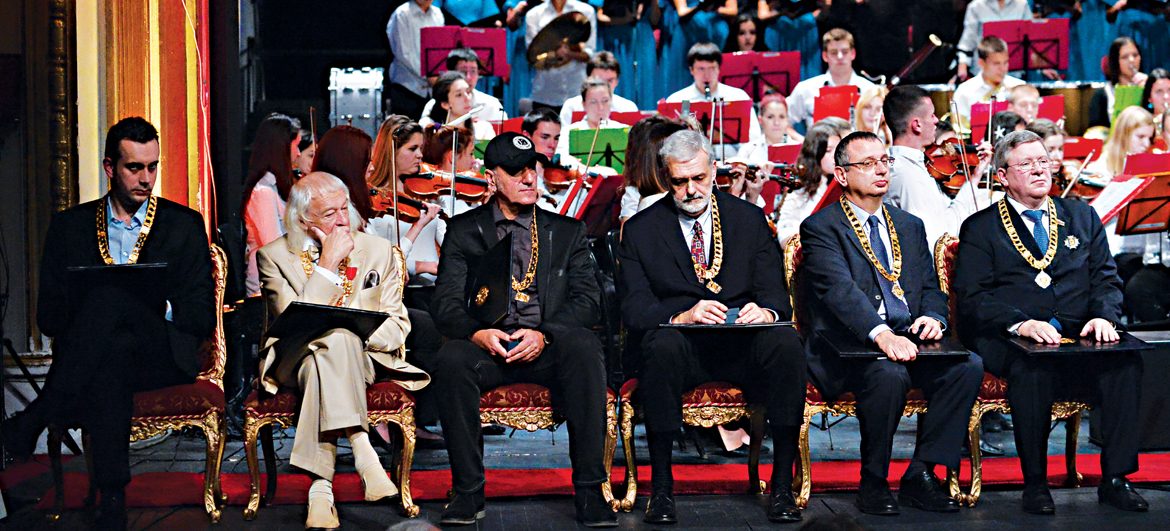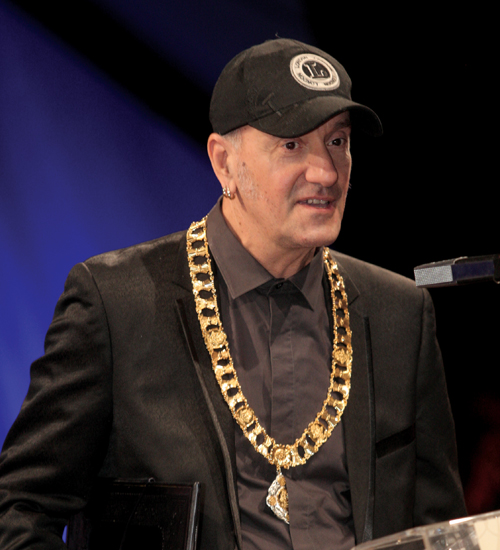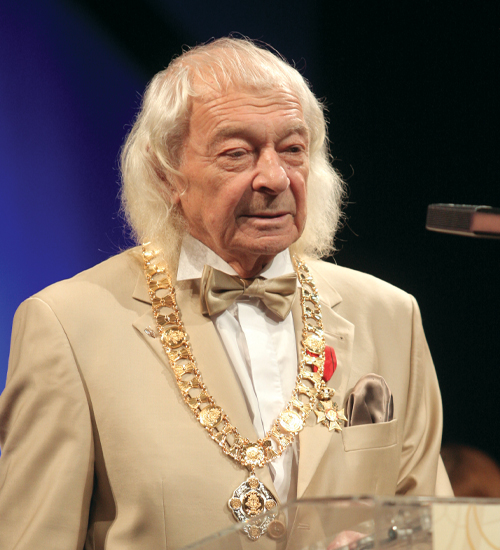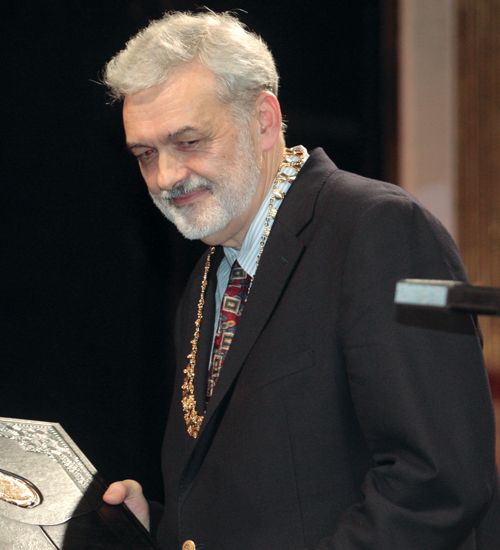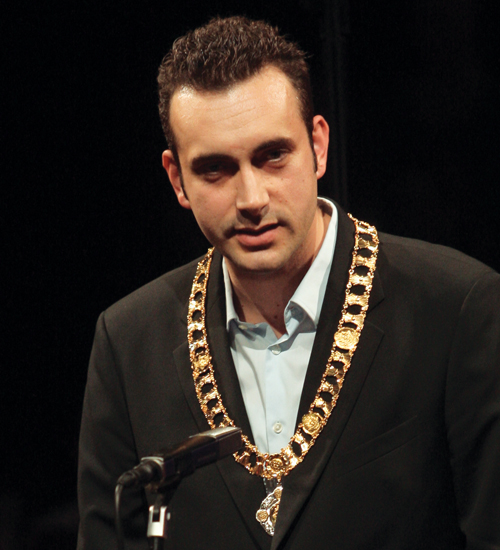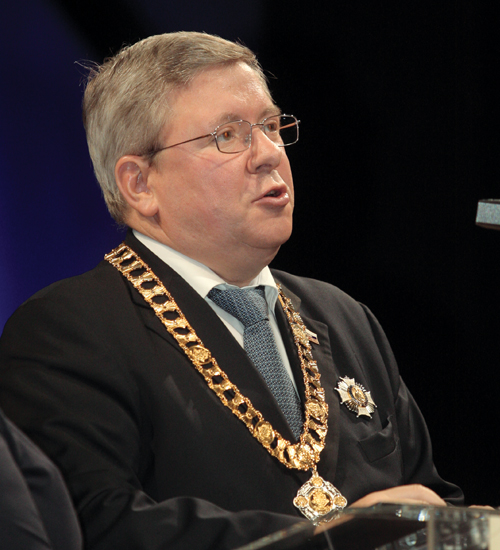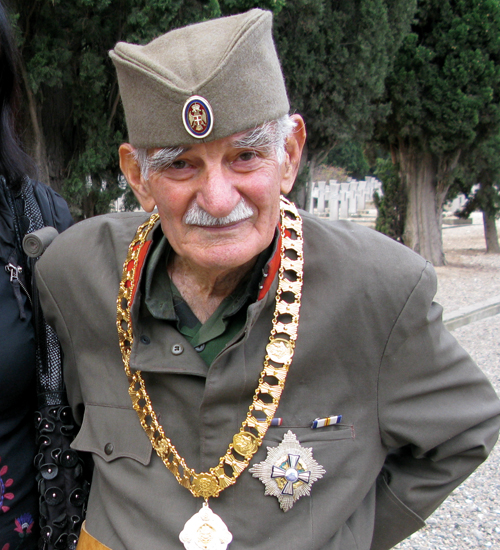The ‘Karic Brothers’ Award Laureates in 2013
VLATKO STEFANOVSKI
PROMOTING BALKAN MUSIC AND CULTURE WORLDWIDE
Only true virtuosos leave the impression that the instrument and the man are in perfect harmony that we are listening to.
We get to see such uniqueness and such talent only with genuine masters. Vlatko Stefanovski is one of them.
Although the word guitarist is most often next to his name, his guitar is not just an instrument, but a mission which has for decades now united melodies and rhythms of the Balkans into a distinctive sound. With the sound that depicts the lift in the Balkans. His compositions, a special style of fusion music, combine traditional and modern rhythms. Essentially, it is difficult to define that music. It is original, past and present, but above all, timeless.
Vlatko Stefanovski was born in 1957 in a family of actors, and he started playing the guitar at an age of 13. He formed the band “Leb i sol” before he turned 20. The band recorded 14 albums, performed across the world and was one of the leading bands of the Yugoslav music scene.
Since the mid-1990s, Stefanovski has made a very successful solo career. He has recorded remarkable solo releases, like Cowboys & Indians, Sarajevo, Vlatko Stefanovski Trio, “Kula od karata” (Tower of Cards), Thunder from the Blue Sky, etc. The collaboration with Miroslav Tadic on the albums Kruševo, “Treca majka” (Third Mother), Live in Belgrade and Live in Zagreb put a new light on Vlatko’s acoustic guitar work and his further exploration of the Balkan traditional music.
In the last several years he has played and recorded all around the world with many top artists like Tommy Emmanuel, Stochelo Rosenberg, Gibonni, Jan Akkerman, Theodosii Spassov Stefan Milenkovi}, Kudsi Erguner, Bojan Z., Manu Katche, Toni Levin, and many others. Those concerts once again confirm the thesis that music knows no borders of languages, nations and states.
Vlatko Stefanovski also composes music for films, theatre and ballet.
We will just mention the music for the film “Gypsy Magic” by Stole Popov, on the basis of which he also released an album with the same name.
As a soloist Vlatko has performed and recorded with numerous orchestras and ensembles, like London Symphony Orchestra, MDR Leipzig Symphony Orchestra, Monte Carlo Philharmonic Orchestra, Tonkünstler Orchestra from Vienna from Vienna, Sofia Sinfonietta Orchestra, Slovenian Philharmonic Orchestra from Ljubljana, Student Symphony Orchestra from Skopje, Macedonia, Fool Cool Jazz Big Band, RTV Ljubljana Big Band, Croatian HTV Big Band, Radio Television Serbia (RTS) Big Band, etc.
Stefanovski is well known as a guitar player of exceptional technique and tone. With his Vlatko Stefanovski Trio, he has performed around the world. In 2007, Stefanovski received a honorary degree of a doctor honoris causa in the field of art at the University St. Kiril and Metodij in Skopje. He lives with his family in Skopje, Macedonia, and owns a well-equipped studio named Esoteria Sound Studio.
The Karic Brothers Award is awarded to this exceptional artist who established bridges of cooperation with many musicians and ensembles from the region and the world, with the aim of promoting the Balkan music and culture in the world.
Extract from the winner’s speech:
“I am exceptionally honoured to be granted the Karic Brothers Award. I am probably the first Macedonian to receive this award, which makes me particularly happy. I haven’t prepared a speech, but let me in an Award-winning fashion express my thanks to my family, wife Gordana and children Ana and Jan, who are my greatest inspiration and motivation for everything I do. I’m really very honoured that the award was given to me as I come from Macedonia, which gives the award an even greater weight, because I think that in this way we can only improve the already good relations between Macedonia and Serbia. Thank you very much. Allow me to thank you in the best way possible, and in the best way that I know, by playing something for you.”
Academician SERGIY PANTELEYMONOVICH SITKO
FOUNDER OF MEDICINE OF THE THIRD MILLENNIUM
Our people have a saying that a healthy person has many wishes, but the sick person has only one. Health is our greatest wealth. It determines each man’s quality of life.
Is a treatment without the common drug therapy possible in the 21st century? What are the curative effects of microwaves? What does AMSAT diagnostics that has been long used for medical examination of astronauts mean? These are but a few issues that quantum medicine is interested in. Academician Sergiy Panteleymonovich Sitko is one of its inventors and founders.
As an outstanding physicist, he was able to easily understand the secrets of molecular, atomic and nuclear organisation of everything that exists, but, together with the leading scientists of the 1970s, he ingeniously anticipated the fourth degree of the quantum scale, the degree of life. With this discovery he established a new direction in science – the Physics of the Alive that became the basis for quantum medicine. During the last forty years a team of outstanding physicists, doctors, biophysicists, biochemists, led by professor Sitko has been setting up, developing and scientifically grounding the method of quantum medicine – Microwave Resonance Therapy.
In his work, the professor is striving to explain Life as a unique phenomenon, to reach that which fundamentally separates animate from inanimate, animate from animate, man from bird, but also man from man!
Past discoveries of modern science have provided the answer to the question HOW. Professor Sitko is seeking for answer to the question WHY by trying to understand this divine software that synchronises billions of cells into a unique system that is a human being. This is why he is calling his method the divine medicine.
He became a meritorious scientist of Ukraine in 1992. He was awarded the Belgian Order of Knighthood in 1990 in recognition of his scientific contribution in the fields of physics and medicine.
Academician Sitko is a member of the Academy of Technological Sciences of Ukraine, he is the head of the department for new medical technologies. He is the president of the Association of Ukrainian Medical Physicists. He is also the president of the International Charity Fund of Sergiy Sitko. He is the founder and editor-in-chief of the scientific journal “Physics of the Alive” that is being published under the auspices of Shevchenko National University of Kyiv.
He is an honorary member of the United Nations Human Rights Committee. Born on 1 April 1936 in Kyiv, professor Sitko devoted himself to scientific work at an early stage in life. He majored in physics and defended his PhD theses in the field of nuclear physics and mathematics at the Shevchenko University of Kyiv, where he worked as a professor of nuclear physics until 1986. At that point he took over the Scientific Research Centre for Quantum Medicine Vidhuk, which would develop into a leading organisation in this field.
For his achievements in the field of quantum medicine our laureate was nominated for Nobel Prize two times.
He is expecting a third nomination, but in 300 years, because, as he says – only then will the world be ready to accept and understand his ideas.
Quantum medicine was declared the medicine of third millennium in Brussels in 1989.
Extract from the winner’s speech:
“Ladies and gentlemen, I am very proud to be the first one from Ukraine to receive this very significant award of the Karic Foundation. I am also very grateful to the entire Serbian nation because of the fact that the grains of the new medicine, the grains that are scattered around the world, found fertile ground right here in Serbia. When a new level of quantum physics was discovered, and that’s just the physics of the living, the science of living first became a fundamental science, and it has been so to this day. Thanks to this great intuition of the Serbian people and its intelligence, the new science was quickly accepted, even at the state level. In Serbia today, there is a school of quantum medicine, which practically constantly trains new doctors to practice medicine whose efficiency is incomparable with the medicine used so far. I express my gratitude to the Ukrainian people, to the Serbian people and the Karic Brothers Foundation for the great trust given to me. May the friendship of Ukraine and Serbia continue to flourish!”
ZEFIRINO GRASI
PROFESSIONALISM AND DURABILITY
Believing that everything is predestined, we will think it is no coincidence that our tonight’s winner of the Karic Brothers Award for journalism was born on 25 January 1954 – on the 50th birthday of Politika. Just 22 years later, having graduated from the Faculty of Political Sciences in Belgrade, he will get a job in Politika. Since then to date, Zefirino Grasi has done all reporting and editing jobs, starting from Politika daily, the writing of report for “Ilustrovana Politika” magazine, until in 1985 he became deputy to Vladimir Bulatovi} Vib, the then editor-in-chief of “Politikin Zabavnik”. He became editor-in-chief of “Politikin Zabavnik” in late 1989. He has remained on that position to date, and since 2011 he is also acting general director of Politika Newspapers and Magazines.
So the name of our oldest media company and of our laureate intertwined through a joint biography which is characterised by professionalism and durability.
Of all responsible jobs and responsibilities during that joint biography, what certainly remains the major trace in Zefirino Grasi’s professional career of a journalist for the general public is his engagement as editor-in-chief of “Politikin Zabavnik”, the magazine that during more than 70 years of its existence incited interest of both children and adults with the same kind of intensity.
In a brief biography of “Politikin Zabavnik”, it is recorded that Politika in its New Year’s edition of 31 December 1938, on page 7 published the following announcement: “We invite you to propose a name for the new entertainment magazine to be published by Politika. It will include novels, stories and comics.” So that the people would not have thought of it as yet another one of the many ads, the advertisement was followed by the promise that “for this effort, the winners will receive twenty thousand dinars in cash and fifteen thousand dinars in annual subscriptions for the new magazine.”
Proportionally to the reputation that Politika had back then, 34,998 coupons arrived at the competition. There were all kinds of suggestions, but the winning one was “Politikin Zabavnik”. Nearly one-fifth or more precisely 18 per cent of the participants of the competition were unanimous.
Readers enthusiastically embraced the new Zabavnik magazine in 1939. In a short time the new magazine became favourite amongst readers. It can be said that it has remained so until today.
At the celebration of the 70th anniversary of Zabavnik, Zefirino Grasi said that it is a magazine that since its foundation has taught children to read and write, but also to be curious, creating space for them to acquire some new, different knowledge.
As he himself was once a boy, he recalls that Prince Valiant, Alan Foster’s comic book hero, was the first hero in his childhood because he was righteous, fair, hard working and brave, he loved his country, he would never give up easily, he had a well-constructed feeling toward his family, he was noble, and above all – he was a knight.
This is what describes and determines them; Zefirino Grasi and “Politikin Zabavnik” chivalrously share all that today.
Extract from the winner’s speech:
“I see this award primarily as a recognition for Politika Zabavnik and an award for all Zabavnik employees, as an award for all Zabavnik’s associates, several hundred of them. I’m just for the first among the equals there, I’ve always been that and it will probably continue to be like that, as long as I’m here. As if the Karic Brothers Award is to embrace some great events that await us, which might have some kind of fateful significance, I don’t know, we’ll see. So, Zabavnik will soon turn seventy-five. Our parent company, Politika, will soon celebrate its 110th anniversary, another magazine from our company “Ilustrovana Politika” will fill turn fifty-five, and I’ll soon turn sixty. This award will certainly remain the most important one in my life because of three things. First, it is my first professional award, and it is such an important award, and secondly, I found myself in such a company of winners of the Karic Brothers Award, and not only this year’s winners but all the previous winners. Everyone would just wish to be in a company like that. The third part is particularly important, I know with certainty that the founders of this award and the founders of the foundation have in their home all issues of Zabavnik, from the first to the last issue. Thank you again.”
ZVONKO BOGDAN Winery
IN VINO VERITAS
They say that the wine should be spoken about quietly, preferably with a glass of wine. And then, they say, we will become as wise as the wine we were drinking. If the sky did not like wine, would the sunlight be there to support its growth – is an old wisdom. Judging by it, the sky above the Subotica-Horgoš Sands likes wine since the sunlight has been warming it for more than 2000 years. A part of this beautiful tradition is continued by Zvonko Bogdan Winery by cultivating wise wines in its cellars. This modern winery is located in a traditionally wine region, at the eastern shore of Palic Lake, to the very north of Vojvodina. The specific terrain, moderate continental climate and quality varieties of vine have for centuries been delivering wines of harmonic flavour, intensive aroma, and soft tannins.
Zvonko Bogdan Winery is surrounded by 17 hectares of vineyards with additional 9 hectares at the shore of the neighbouring lake Ludaš. Some 17 hectares of vine have been planted this year, while additional 13 hectares will be planted in spring, which will amount to the total of 56 hectares of vineyards. They say that it represents a natural limit up to which taking heartily care of grapes and wine is possible.
Bottles with Zvonko Bogdan Winery label contain the highest quality varieties such as sauvignon blanc, pinot blanc, merlot, lemberger and cabernet franc. And all of those wines, containing the truth, have for years been receiving the highest awards at prestigious European and world fairs and exhibitions.
Pinot blanc, with it crystal clear, golden yellow colour, discrete bouquet enriched with apple and pear aromas and mild nuances of meadow flowers, was this year awarded silver medals in San Francisco, Japan and Brussels as well as in Vienna last year.
Cuvée “Panta rei” came back from Brussels crowned with a gold medal. Cuvée No. 1 came back from San Francisco and Vienna with gold medals while it brought back silver from Brussels. Those victorious wines are accompanied by Rose and Sauvignon blanc.
Many were assured of the quality of these wines at the famous tastings at the winery itself, but also at Zvonko Bogdan’s ranch… For there is a reason why the name of the bard of tambour songs is connected to this story.
Vine growing is the greatest art in agriculture. Wines from our area once represented a common relish at the imperial dining tables of Russia and Austria-Hungary. The heading of the export list of the famous wine producer and the royal court supplier Petar Kostic testifies that wines from Vojvodina had been exported worldwide. The document dates back from 1934 and concerns export of wine to New York. After travelling the distance from Sremski Karlovci to New York, some of our wines made their way into the wine list of the Titanic. After years of stagnation, our wines are on the rise again – they are praised, awarded and recognised. For all challenges on its difficult, challenging, but also creative road – the Karic Brothers Award for business and economy goes to Zvonko Bogdan Winery – for the wines with character, tradition and skill.
Extract from the winner’s speech:
Zlatko Živanić
“I can only thank for this valuable award on behalf of Zvonko Bogdan Winery. Zvonko Bogdan Winery is a young winery, but also, in terms many things we are the pioneers at the Serbian wine market. This year we have won dozen awards around the world, maybe even up to two dozen gold and silver medals – in Copenhagen, Brussels, Tokyo, London, Vienna, San Francisco … The Karic Brothers Award is the first award this year that we receive for the work of the entire winery, not only for the quality of our wines, but also for the whole business. It is a great honour to us, and we are especially happy to know that someone in Serbia values our effort and work. Thank you very much.”
ALEKSANDAR PORFIRJEVIČ TORŠIN
LET US PRESERVE THE FLAME OF FAITH
“For as the body apart from the spirit is dead, so also faith apart from works is dead,” says the Epistle of James. This biblical saying hides the greatest wisdom. “So let us unite our efforts and, without being distracted by empty talks about political issues, help to preserve the life of Christian sanctuaries in Kosovo and Metohija, preclude the fire of faith from fading, give hope to those people who in depths of despair turn to brotherly Russia for support,” these are the words of Nina and Aleksandr Torshin, the founder of the International Foundation of Saint Sabbas the Sanctified for preservation of Christian sanctuaries in Kosovo and Metohija.
The main principle mission of this non-profit making foundation is to provide expert, financial and organisational assistance in the field of restoration and preservation of temples, monasteries and monuments of Christian culture in Kosovo and Metohija.
This is to prevent Christian monasteries and churches in Kosovo and Metohija, in which the heart of Eastern Orthodox Christianity has been beating from the earliest of times, from becoming lifeless museums – without ecclesiastics, believers, without people who practice the Orthodox faith.
Recognising the universal language of charity, the Kari} Foundation awarded Alexander Porfiryevich Torshin the Karic Brothers Award for humanity and charity.
Our laureate is the First Vice-Chairman of the Council Federation of the Federal Assembly of the Russian Federation.
He was born on 27 November 1953 in the village of Mitoga, Ust-Bolsheretsky district of Kamchatka Krai in Russia. He graduated from All-Union Law Correspondence Institute with a degree in law. He is an honorary lawyer of the Russian Federation and Mari-El Republic and is a regular state counsellor of the Russian Federation of the 1st class.
Since August 2004, he has been a member of the United Russia party.
He has been awarded the state awards of the Russian Federation, thank-you letters from the President of the Russian Federation, the government of the Russian Federation and the Chairman of the Federation Council.
He is married, with two daughters and a granddaughter.
The initiative to create the Foundation was first introduced by Aleksandr Porfiryevich Torshin during his visit to Serbia for the participation in the ceremony of enthronement of His Holiness Serbian Patriarch Irinej, that took place on 3 October 2011 in the temple of the Holy Apostles in Patriarchate of Pec.
The foundation was named in honour of Saint Sabbas the Sanctified who was a great ascetic from the first centuries of Christianity and is venerated by both Eastern Orthodox and Roman Catholic Christians. In monkhood the name of Saint Sabbas was borne by Venerable Sabbas of Storozhev, spiritual confessor of Russia and by Saint Sava of Serbia, a saint of the Serbian Orthodox Church. Thus, the name of the Foundation symbolises the unity between believers of Serbia and Russia.
Likewise, benevolence of its founders, the fact that they did not remain cold-hearted before the destiny of Kosovo Serbs, testifies about the eternal flame of recognition that warms hearts of Serbian and Russian peoples up to this day.
Extract from the winner’s speech:
“Your high-Grace, the Patriarch of the entire Serbia, your Excellency, Ambassador of the Russian Federation to Serbia, ladies and gentlemen, dear friends, let me first thank the Karic Foundation and the entire Karic family for the great contribution in strengthening the ties between Russia and Serbia. I also wish to thank the great builder Dragomir Karic, who built a large number of wonderful buildings across Russia. It is a special honour for me to receive the Karic Brothers Award, because it is my first international award, which is awarded for humanitarian work. I also want to thank my wife, Nina Torshin, for support. Not only is she fluent in Serbian, but she helps me a lo with the Fund. This fund was established with the blessing of the Patriarch of Russia and the Serbian Patriarch. Let me say that the Torshin brothers and the entire Torshin family will do everything so that relations between Serbia and Russia become even better. Thank you very much, to the glory of the Russian-Serbian friendship.”
ĐORĐE MIHAILOVIĆ
COSTLY LIBERTY
One people’s tradition can be preserved in many different ways. The occupation of our laureate is certainly most unusual – he is the keeper of the Serb cause and of the Serbian tradition.
Djordje Mihailovic is the guardian of the Serbian cemetery Zeytinlik in Thessaloniki.
From that place the Serbian army went into the breakthrough of the Salonika Front. On orders of commander Živojin Mišic: “With unswerving faith and hope, heroes, onwards to the fatherland” – militarily speaking, the army made a breakthrough of the Salonika Front and wrote one of the holiest and most brilliant pages of Serbian military history. French marshal Franchet d’Espèrey wrote in a report on the breakthrough of the Front to his government: “Operations need to be slowed down as there is no communication to deliver food to advancing French troops; only Serbian troops need no communication, they move like a storm – forward.” Robert Lansing, US Secretary of State, said on the same topic: “When the history of this war is written down, its most glorious chapter will bear the title SERBIA.”
Serbia’s glory was recorded, but Serbia’s sacrifices were also immense.
The price that Serbia paid for the great victory in the First World War was disproportionately heavy. During the war, it lost an estimated 1,100,000 to 1,300,000 inhabitants, making up nearly a third of its total population, or as much as 60% of the male population. No other country participant of the Great War paid so dearly for its freedom.
The Serbian bones were scattered around the ice gorges of Albania, Durres, embedded into the rock of the Greek islands of Corfu and Vido, covered by the blueness of the Ionian Sea in the Blue Tomb.
All Serbian soldiers, some eight thousand of them, but also French, Italian, English and Russian soldiers fallen in the battles for the breakthrough of the Salonika Front in the First World War are resting at the Serbian Military Cemetery Zeytinlik. They are guarded by Djordje Mihailovic, the third generation of the Mihailovics with the same walk of life. He sees his occupation as a covenant and as a tradition which tells the story to all who come to Zeytinlik.
His grandfather Savo was a volunteering soldier in Thessaloniki. As a guardian of the Serbian Military Cemetery, he collected the bones of comrades from Gorni~evo to Bitola, in Kajmak~alan, Veterinik, Dobro Polje, Ko`ar and Kozjak. He pulled them out of shallow graves at secluded places. His father \uro continued the mission and guarded Zeytinlik until 1961. His last will for his son Djordje was: “You inherit me. It is an honour. And honour, my son, has no price tag.”
There are stone birds of white crosses lined up in column. They are on constant watch of the dedicated guardian \or|e Mihailovi}. Each of the mounds is kept in order, the grass is mown, there is a wreath of flowers here and there that arrived from Serbia, a couple of apples and a dozen of pears and a story incensed and sodden with blood and tears, purified by faith in the rightness of the victim for a good cause. The truth about a people for which casualties were historically most often a question of life, and death – a reflection of the faith in life. Djordje Mihailovic has been preserving for generations now the truth from this dire and magnificent place and is keeping it from oblivion in the future.
The guardian of the Serbian Military Cemetery is now 85. Reverend and responsible, just as his ancestors bound him by a pledge – he will not leave the dead heroes.
No one of the Mihailovi}s, including \or|e, ever got any official recognition from the homeland Serbia for caring for the Serbian military cemetery in Thessaloniki for almost one century.
The Kari} Foundation awards him the Kari} Brothers Award for perseverance, care and dedication to the preservation of the tradition and historical heritage of the Serbian people.
Extract from the winner’s speech:
“My grandfather Savo Mihailovic was a fighter during the First World War, and then he was the first guard of the Serbian military cemetery Zeytinlik in Thessaloniki until 1930, when he died. My father Djuro Mihajlovic was the guardian of the Serbian military cemetery until 1960, and I then took over from my father that honourable duty and the family tradition. I’ve been taking care of our cemetery for more than half a century. I guard it, keep it clean and tell the story of Serbian heroes who are buried here to all who come to visit the cemetery. As I am getting older, it’s becoming a little harder, but I’m not going to retire until there is someone to replace me. I have to teach everything the one who’ll replace me. There are many destinies here, and someone just comes here, sees a name, years of birth and death – and that’s it. And it is not so. This is where the history of the Serbian people was buried and preserved. I want to thank the Karic family for giving me this important award. This is the award for three generations of the Mihailovics who have taken care about the Serbian military cemetery. I could not come to Belgrade to receive the award, because I am too old, I did not want to make a problem, for someone to have to take care of me. I am receiving this award wholeheartedly. Thank you for coming to Zeytinlik, thank you for everything.”




